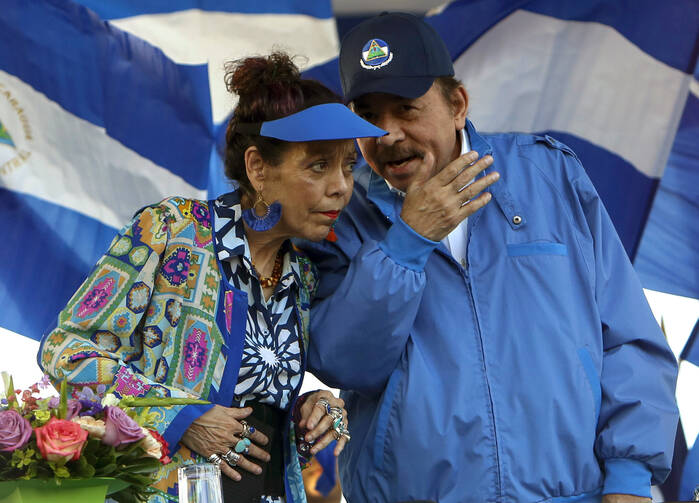Nicaraguan authorities on Aug. 23 revoked the legal status of the Society of Jesus and ordered the confiscation of its remaining properties. The confiscation order claimed the Jesuits had failed to comply with tax reporting regulations.
It was the latest in a series of increasingly authoritarian actions by the Nicaraguan government against the Catholic Church and opposition figures, and it comes just one week after the government confiscation of the Jesuit-run Universidad Centroamericana (U.C.A.) in Managua.
In a statement issued on Aug. 23, the Central American Province of the Society of Jesus in El Salvador condemned “this new aggression…against the Jesuits of Nicaragua,” describing the recent government moves against the Society as part of a “national context of systematic repression described as ‘crimes against humanity’ by the group of experts on Human Rights on Nicaragua formed by the United Nations.”
Nicaraguan authorities on Aug. 23 revoked the legal status of the Society of Jesus and ordered the confiscation of its remaining properties.
The Jesuits pointed out that the latest move to deny the Society the legal basis to continue its work “was made without the record of the administrative procedures,” contravening Nicaragua’s own laws, adding that the Society was not offered the opportunity to defend itself before an impartial judge against the technical complaints raised against the religious order. According to the statement, the nullification of the Jesuits’ status followed the same pattern used to expel more than 3,500 other civil society actors in Nicaragua since 2018.
The latest moves by the Ortega regime came close to a direct expulsion of the Jesuits without actually stepping over that line, according to Enrique Pumar, a professor of sociology at Santa Clara University in California, an expert on Latin American revolutions and immigration issues. “This is a very smart move that autocrats sometimes use,” he said, not expelling the Jesuits but making it increasingly difficult for them to work in Nicaragua. If they are forced to leave in this manner, he explained, Mr. Ortega can say it was the Jesuits’ decision to withdraw from the country, not his.
Mr. Ortega has become deeply isolated in Latin America because of his regime’s increasing authoritarianism, he said. According to Mr. Pumar, the Jesuits remain popular in Nicaragua and Mr. Ortega’s moves against them have focused international attention on Nicaragua. Mr. Ortega does not wish to personally order their expulsion, he said. “The last thing that he wants is to alienate people even more.”
The latest moves by the Ortega regime came close to a direct expulsion of the Jesuits without actually stepping over that line, according to an expert on Latin American revolutions.
The Jesuits described these latest steps against the order as further expressions of an abusive and arbitrary use of power by President Ortega and his wife, Vice President Rosario Murillo, which is accelerating Nicaragua toward totalitarian rule. They challenged Mr. Ortega and Ms. Murillo to take personal responsibility for the decision to remove the Society of Jesus and seize its properties, noting that it was within their power to restore the independence of the courts and reverse these recent confiscation orders.
The Jesuits urged Mr. Ortega to “stop the repression,” rejoin a dialogue toward a rational end to the political crisis that has roiled the nation since anti-government protests in 2018 and to “respect the freedom and total integrity of the Jesuits and the [lay] people who collaborate with them or with whom they collaborate.”
According to the statement, the Jesuits now join “thousands of Nicaraguan victims who are waiting for justice to be done” and for reparations for the damage caused by the current government.
Government antipathy to the Jesuits and the church in Nicaragua has been increasing since widespread anti-government demonstrations in 2018 resulted in more than 300 deaths. U.C.A. officials at that time had given protestors fleeing sniper fire sanctuary on school grounds.
Over the last three years, Mr. Ortega has arrested and exiled opposition leaders and silenced critical media voices. A campaign against the church in Nicaragua has been accelerating this year. It has already included the ouster and exile of Catholic priests and men and women religious and the seizure or administrative shutdown of 27 institutions of higher learning.








